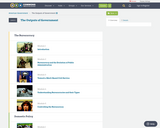
139 Results


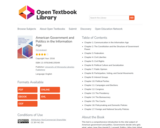
This text is a comprehensive introduction to the vital subject of American government and politics. Governments decide who gets what, when, how (See Harold D. Lasswell, Politics: Who Gets What, When, How, [New York: McGraw-Hill, 1936]); they make policies and pass laws that are binding on all a society’s members; they decide about taxation and spending, benefits and costs, even life and death.Governments possess power—the ability to gain compliance and to get people under their jurisdiction to obey them—and they may exercise their power by using the police and military to enforce their decisions. However, power need not involve the exercise of force or compulsion; people often obey because they think it is in their interest to do so, they have no reason to disobey, or they fear punishment. Above all, people obey their government because it has authority; its power is seen by people as rightfully held, as legitimate. People can grant their government legitimacy because they have been socialized to do so; because there are processes, such as elections, that enable them to choose and change their rulers; and because they believe that their governing institutions operate justly.Politics is the process by which leaders are selected and policy decisions are made and executed. It involves people and groups, both inside and outside of government, engaged in deliberation and debate, disagreement and conflict, cooperation and consensus, and power struggles.In covering American government and politics, this text introduces the intricacies of the Constitution, the complexities of federalism, the meanings of civil liberties, and the conflicts over civil rights;explains how people are socialized to politics, acquire and express opinions, and participate in political life; describes interest groups, political parties, and elections—the intermediaries that link people to government and politics; details the branches of government and how they operate; and shows how policies are made and affect people’s lives.
- Subject:
- Political Science
- Social Science
- Material Type:
- Textbook
- Provider:
- University of Minnesota
- Provider Set:
- University of Minnesota Libraries Publishing
- Author:
- David L. Paletz
- Diana Owen
- Timothy E. Cook
- Date Added:
- 06/06/2011
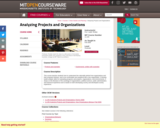
This course teaches students how to understand the rationality behind how organizations and their programs behave, and to be comfortable and analytical with a live organization. It thereby builds analytic skills for evaluating programs and projects, organizations, and environments. It draws on the literature of the sociology of organizations, political science, public administration, and historical experience-and is based on both developing-country and developed-country experience.
- Subject:
- Political Science
- Social Science
- Material Type:
- Full Course
- Provider:
- M.I.T.
- Provider Set:
- M.I.T. OpenCourseWare
- Author:
- Tendler, Judith
- Date Added:
- 01/01/2009
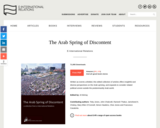
Written as events unfolded, this edited collection of articles offers insightful and diverse perspectives on the Arab uprising, and expands to consider related political unrest outside the predominantly Arab world.
- Subject:
- Political Science
- Social Science
- Material Type:
- Textbook
- Provider:
- E-International Relations
- Author:
- Al McKay
- Date Added:
- 07/07/2021
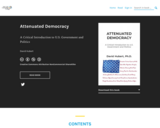
The U.S. political system suffers from endemic design flaws and is notable for the way that a small subset of Americans—whose interests often don’t align with those of the vast majority of the population—wields disproportionate power. Absent organized and persistent action on the part of ordinary Americans, the system tends to serve the already powerful. That’s why this text is called Attenuated Democracy. To attenuate something is to make it weak or thin. Democracy in America has been thin from the beginning and continues to be so despite some notable progress in voting rights. As political scientists Benjamin Page and Martin Gilens wrote, “The essence of democracy is not just having reasonably satisfactory policies; the essence of democracy is popular control of government, with each citizen having an equal voice.” (1) Since this is likely to be your only college-level course on the American political system, it is important to point out the structural weaknesses of our system and the thin nature of our democracy. Whenever you get the chance—in the voting booth, in your job, perhaps if you hold elected office—I encourage you to do something about America’s attenuated democracy.
- Subject:
- Political Science
- Social Science
- Material Type:
- Textbook
- Provider:
- Salt Lake Community College
- Author:
- David Hubert
- Date Added:
- 07/07/2021
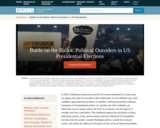
In 2016, a billionaire businessman and the first woman nominated by a major party ran against each other for president of the United States. In very different ways, both candidates approached the presidency as outsiders, reaching beyond the traditional boundaries of US presidential politics. As outsiders, the 2016 candidates are noteworthy, but not unique; indeed, the 2016 race resonates with the legacies of outsiders who have come before. This exhibition explores the rich history of select individuals, parties, events, and movements that have influenced US presidential elections from the outside—outside Washington politics, outside the two-party system, and outside the traditional conception of who can be an American president.
- Subject:
- Political Science
- Social Science
- Material Type:
- Diagram/Illustration
- Reading
- Provider:
- Digital Public Library of America
- Provider Set:
- DPLA Exhibitions
- Date Added:
- 09/01/2016
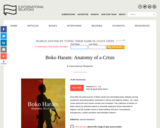
During recent years the phenomenon of Boko Haram has dominated policy debates among academics and policymakers interested in African and Nigerian politics. Yet, many issues about the sect remain unclear and contested. This collection of articles on Boko Haram by selected experts is essential reading for those interested in Nigeria, and the broader issues of state building, terrorism, humanitarian emergencies, conflict resolution and intrastate violence.
- Subject:
- Political Science
- Social Science
- Material Type:
- Textbook
- Provider:
- E-International Relations
- Author:
- Ioannis Mantzikos
- Date Added:
- 07/07/2021

This inquiry examines the 20th century history of migration from Mexico to the United States and recent efforts to limit the movement of people across the southern U.S. border. The inquiry takes its inspiration from a 2018 podcast episode by Malcom Gladwell titled, “General Chapman’s Last Stand.” The podcast is part of Gladwell’s Revisionist History series (http://revisionisthistory.com). In the podcast, Gladwell tells the story of General Leonard F. Chapman Jr., Commandant of the Marine Corps during the Vietnam War, who went on to serve as the Commissioner of the Immigration and Naturalization Service (INS) from 1972 to 1975. Chapman is credited with reforming the INS into a more efficient and effective agency, but Gladwell argues that Chapman’s efforts also led to an unintentional increase in unauthorized immigrants. In 1970, 760,000 Mexican immigrants, or 1.4% of Mexico’s population, lived in the U.S. By 2008, there were 12.7 million Mexican immigrants in the U.S. which amounted to 11% of all people born in Mexico; an increase of almost 800% in less than 30 years. The question of how and why this happened is the central focus of this inquiry.
- Subject:
- History
- Political Science
- Social Science
- U.S. History
- Material Type:
- Lesson Plan
- Primary Source
- Provider:
- New York State Education Department
- Provider Set:
- C3 Teachers
- Date Added:
- 07/07/2021
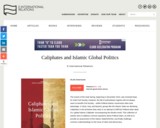
The events of the Arab Spring, beginning in December 2010, saw renewed hope for Arab Civil Society. However, the fall of authoritarian regimes did not always seem to benefit Civil Society – whilst Political Islamic movements often took advantage. In Syria, Iraq, and beyond, groups like the Islamic State are declaring Caliphates in the territories they seize in an attempt to fulfil the Political Islam ideal of a ‘global Islamic Caliphate’ encompassing the Muslim world. This collection of articles aims to address common questions about Political Islam, as well as to provide an assessment of the Islamic State/ISIS/ISIL and finally challenge common understandings on the issue of Islam and democracy.
- Subject:
- Political Science
- Social Science
- Material Type:
- Textbook
- Provider:
- E-International Relations
- Author:
- Robert L. Oprisko
- Timothy Poirson
- Date Added:
- 07/07/2021
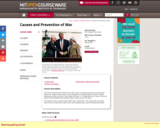
This course examines the causes of war, with a focus on practical measures to prevent and control war. Topics include causes and consequences of misperception by nations; military strategy and policy as cause of war; religion and war; U.S. foreign policy as a cause of war and peace; and the likelihood and possible nature of great wars in the future.
The historical cases covered include World War I, World War II, the Korean War, the Seven Years' War, the Arab-Israel conflict, other recent Mideast wars, and the Peloponnesian War.
- Subject:
- Political Science
- Social Science
- Material Type:
- Full Course
- Provider:
- M.I.T.
- Provider Set:
- M.I.T. OpenCourseWare
- Author:
- Stephen Van Evera
- Date Added:
- 07/06/2021
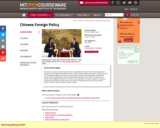
This lecture course provides students with a comprehensive introduction to the international relations of the People's Republic of China. China's foreign relations during the Cold War as well as contemporary diplomatic, security and economic issues will be examined to identify and explain China's foreign policy goals and their implementation since 1949. Throughout, this course will investigate the sources of conflict and cooperation in China's behavior, assessing competing explanations for key events and policies. Readings will be drawn from political science, history, and international relations theory.
- Subject:
- Political Science
- Social Science
- Material Type:
- Full Course
- Provider:
- M.I.T.
- Provider Set:
- M.I.T. OpenCourseWare
- Author:
- Fravel, M
- Date Added:
- 01/01/2005
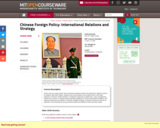
China's rise as a great power raises important questions about how that power might be used in its relations with other states. Nowhere are such questions more salient than in the future trajectory of China's conflict behavior, including its approach to deterrence, crisis management and the use of force. To explore these important questions in China's international relations, this seminar examines the evolution of Chinese strategic thought, in primary sources as well as its reflection in the interactions among Chinese states and between China and other states.
- Subject:
- Political Science
- Social Science
- Material Type:
- Full Course
- Provider:
- M.I.T.
- Provider Set:
- M.I.T. OpenCourseWare
- Author:
- Fravel, M. Taylor
- Date Added:
- 01/01/2009
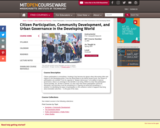
Citizen participation is everywhere. Invoking it has become de rigueur when discussing cities and regions in the developing world. From the World Bank to the World Social Forum, the virtues of participation are extolled: from its capacity to ŰĎdeepen democracyŰ to its ability to improve governance, there is no shortage to the benefits it can bring. While it is clear that participation cannot possibly ŰĎdoŰ all that is claimed, it is also clear that citizen participation cannot be dismissed, and that there must be something to it. Figuring out what that something is -- whether it is identifying the types of participation or the contexts in which it happens that bring about desirable outcomes is the goal of the class.
- Subject:
- Political Science
- Social Science
- Material Type:
- Full Course
- Provider:
- M.I.T.
- Provider Set:
- M.I.T. OpenCourseWare
- Author:
- Baiocchi, Gianpaolo
- Date Added:
- 01/01/2007
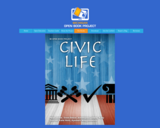
Using an inquiry based approach, Michigan high school students will learn about the foundations of American government by studying the Constitution and exploring how it works today.
- Subject:
- Political Science
- Social Science
- Material Type:
- Textbook
- Provider:
- MIOpenBook
- Provider Set:
- Michigan Open Book Project
- Author:
- Annemarie Conway
- Hillary Baker
- Katie Hintz
- Kelly Dutcher
- Kymberli Wregglesworth
- Travis Balzar
- Date Added:
- 08/15/2017
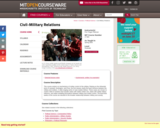
Subject consists of five sections. After a general survey of the field, students consider cases of stable civilian control, stable military rule (coups), and transitions from military to civilian rule. Cases are selected from around the world.
- Subject:
- Political Science
- Social Science
- Material Type:
- Full Course
- Provider:
- M.I.T.
- Provider Set:
- M.I.T. OpenCourseWare
- Author:
- Petersen, Roger
- Date Added:
- 01/01/2003
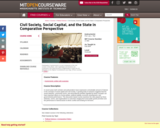
In recent years both scholars and policymakers have expressed a remarkable amount of interest in the concepts of social capital and civil society. A growing body of research suggests that the social networks, community norms, and associational activities signified by these concepts can have important effects on social welfare, political stability, economic development, and governmental performance. This discussion based course examines the roles played by these networks, norms, and organizations in outcomes ranging from local public goods provision and the performance of democracies to ethnic conflict and funding for terrorism.
- Subject:
- Political Science
- Social Science
- Material Type:
- Full Course
- Provider:
- M.I.T.
- Provider Set:
- M.I.T. OpenCourseWare
- Author:
- Tsai, Lily
- Date Added:
- 01/01/2004
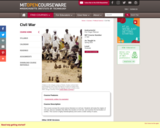
This course surveys the social science literature on civil war. Students will study the origins of civil war, discuss variables that affect the duration of civil war, and examine the termination of conflict. This course is highly interdisciplinary and covers a wide variety of cases.
- Subject:
- Arts and Humanities
- History
- Literature
- Political Science
- Social Science
- U.S. History
- Material Type:
- Full Course
- Provider:
- M.I.T.
- Provider Set:
- M.I.T. OpenCourseWare
- Author:
- Petersen, Roger
- Date Added:
- 01/01/2010
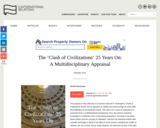
The purpose of this collection is to present Samuel P. Huntington’s ‘Clash of Civilizations’ thesis, and to appraise its validity and shortcomings 25 years after the publication of his landmark article.The notion of a ‘clash of civilizations’ is examined from a multidisciplinary perspective. First, the volume examines Huntington’s contribution from a theoretical perspective, focusing on his ideas about politics and the concept of civilization. Second, the individual articles also consider Huntington’s thesis in the light of recent events, including the conflict in Ukraine, the rise of ISIS, China–India relations, the electoral success of far-right movements in Europe, the refugee crisis in the Mediterranean and the activity of the International Criminal Court in Africa. In sum, this book offers a vibrant and multifaceted conversation among established and emerging scholars on one of the most important paradigms for the understanding of international politics.
- Subject:
- Political Science
- Social Science
- Material Type:
- Textbook
- Provider:
- E-International Relations
- Author:
- Davide Orsi
- Date Added:
- 07/07/2021
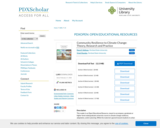
This reader is an Open Educational Resource, meant to accompany a graduate or higher-level undergraduate university course in climate change resilience, adaptation, and/or planning. While the material is geared toward students in urban and regional planning, it may also be of interest to students of urban studies, public health, geography, political science, sociology, risk management, and others.
Each section of this volume includes (1) an introductory summary, (2) a reading list with full-text articles, (3) student exercises meant to enhance understanding and facilitate in-class discussion, and (4) additional discussion prompts or activities for instructors to use in class. The format of materials is intended to convey key concepts while leaving ample space for student exploration, discourse, and creativity. Lessons may culminate in an applied, imaginative final project, a sample framework of which is provided at the end of Section VI.
- Subject:
- Political Science
- Social Science
- Material Type:
- Teaching/Learning Strategy
- Provider:
- Portland State University
- Author:
- Dana E. Hellman
- Vivek Shandas
- Date Added:
- 07/07/2021